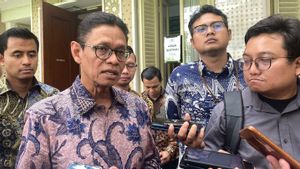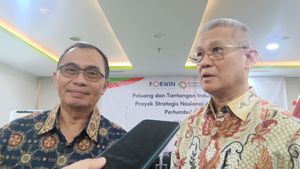JAKARTA - Efforts to prevent stunting or stunting is the main program that is often initiated by the government as an effort to prepare advanced and quality resources for the future.
Especially now that the Indonesian nation is preparing for the 5.0 industrial revolution where superior human resources capable of solving social challenges and problems by utilizing a variety of innovations are needed.
For this reason, efforts to prevent stunting need to be the attention of all parties as well as cross-sectoral cooperation because the nation's future depends on the nation's ability to create a quality gold generation.
Based on data from the Indonesian Nutritional Status Study (SSGI), the Ministry of Health, the prevalence rate of children born with stunted conditions has decreased from 27.67 percent in 2019 to 24.2 percent at the end of 2021, Antara reported, Wednesday, February 2.
The decline in the number of babies born with stunting, of course, cannot be separated from the success of all parties in preventing and overcoming stunting, both preventively, curatively and promotively. Although the number has decreased, efforts to overcome and prevent stunting need to be continued in order to achieve the target set by the government, which is 14 percent in 2024.
It takes effort and hard work from the center to the regions so that the spread of stunting can be controlled, and public education on the dangers of stunting in children must be promoted.
Field Epidemiologist from Jenderal Sudirman University (Unsoed) Purwokerto, dr. Yudhi Wibowo said that people still need to increase awareness and understanding regarding the importance of balanced nutrition for their children. In addition, it is also important to prepare for family life before marriage, determine the pattern of parenting in the family, and increase access to health services.
Posyandu, is the first and main vehicle that can remind the public periodically regarding stunting prevention efforts. Postadu can provide education and socialization regarding the importance of nutritious food as an important element in children's growth. For this reason, the government needs to improve posyandu service facilities in the regions.
The Posyandu is easily accessible to parents who want to monitor their child's development, from head circumference, weight and height, to the child's psychological development. According to dr. Yudhi, a good start for monitoring children's growth and development is started regularly, especially in the first 1,000 days of a child's life.
Parents can also optimize the use of Maternal and Child Health (KIA) books to monitor children's growth and development because there are complete charts that can be used as guidelines for parents in monitoring their children's development.
In the first 1,000 days of life, children need to be given good nutrition as needed during their growth period. It is the duty of parents to ensure the fulfillment of balanced nutrition from carbohydrates, proteins, to minerals that children need.
dr. Yudhi also appealed to the local government to focus on pregnant women by giving blood boosting tablets of at least 90 tablets during pregnancy to prevent stunting babies. There is also socialization and education regarding the importance of exclusive breastfeeding for newborns up to six months of age and followed by complementary feeding (MPASI).
The English, Chinese, Japanese, Arabic, and French versions are automatically generated by the AI. So there may still be inaccuracies in translating, please always see Indonesian as our main language. (system supported by DigitalSiber.id)













